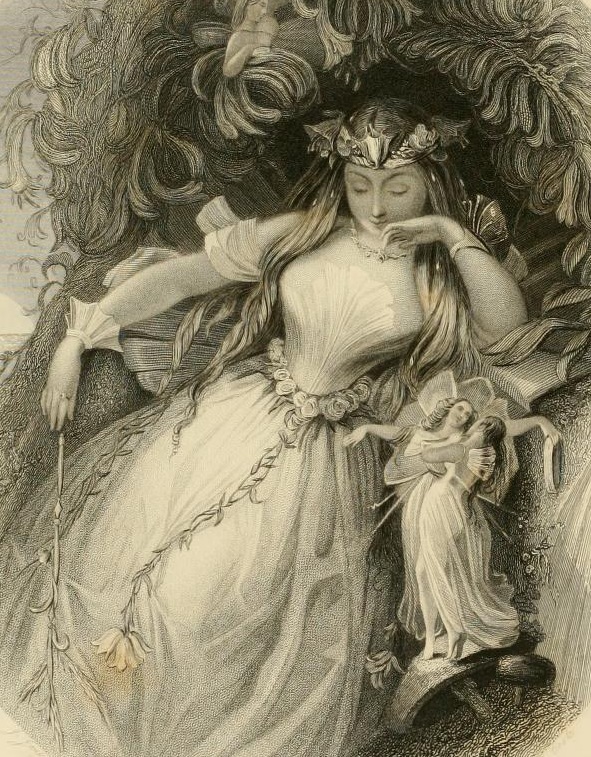The Shakespeare Sisterhood: Titania
Titania ... is a sort of queen-bee in the fairy hive; her sole business is to be beautiful, and to enjoy the beautiful. She is the perfect fairy queen -- exquisite, dainty, luxurious, self-willed, capricious, coquettish; and thoroughly royal in one and all. In her feud with
her husband, King Oberon, she compels our sympathy throughout; she is in the right, and she maintains her position with
commendable firmness and dignity. As to the shameful trick played upon her delicate fancy, we overlook the ridicule in
which it involves her "style," to admire her tender solicitude for her new love, her graceful dalliance, and her lavish hospitality.
Though Titania is introduced to us in the heat of her temporary hostility to her liege lord, it must be confessed that their misunderstanding, especially on her part, is widely removed from the vulgar squabbles of "human mortals." The queen's argument for
peace -- not on her own account, but because their dissension is fraught with consequences disastrous to the inhabitants of Earth --
is in the highest degree lofty:
Obe. Ill met by moonlight, proud Titania.
Tita. What! jealous Oberon? Fairy, skip hence;
I have forsworn his bed and company.
Obe. Tarry, rash wanton! Am not I thy lord?
Tita. Then I must be thy lady. But I know
When thou hast stol'n away from fairy land,
And in the shape of Corin sat all day,
Playing on pipes of corn, and versing love
To amorous Phillida. Why art thou here,
Come from the farthest steep of India?
But that, forsooth, the bouncing Amazon,
Your buskin'd mistress, and your warrior love,
To Theseus must be wedded; and you come
To give their bed joy and prosperity.
Obe. How canst thou thus, for shame, Titania,
Glance at my credit with Hippolyta,
Knowing I know thy love to Theseus?
Didst thou not lead him through the glimmering night
From Perigenia, whom he ravished?
And make him with fair Aegle break his faith,
With Ariadne, and Antiopa?
Tita.These are the forgeries of jealousy;
And never, since the middle summer's spring,
Met we on hill, in dale, forest, or mead,
By paved fountain, or by rushy brook,
Or on the beachy margent of the sea,
To dance our ringlets to the whistling wind,
But with thy brawls thou hast disturb'd our sport.
Therefore the winds, piping to us in vain,
As in revenge, have suck'd up from the sea
Contagious fogs; which, tailing in the land,
Have every pelting river made so proud,
That they have overborne their continents:
* * * * * * * *
And this same progeny of evils comes
From our debate, from our dissension;
We are their parents and original.
Obe. Do you amend it then; it lies in you.
Why should Titania cross her Oberon?
I do but beg a little changeling boy
To be my henchman.
Tita. Set your heart at rest --
The fairy land buys not the child of me.
His mother was a vot'ress of my order;
And, in the spiced Indian air, by night,
Full often hath she gossip'd by my side,
And sat with me on Neptune's yellow sands,
Marking the embarked traders on the flood.
But she, being mortal, of that boy did die;
And, for her sake, I do rear up her boy;
And, for her sake, I will not part with him.
It is as unnecessary to comment on the mean selfishness of Oberon's answer to her appeal in behalf of the distressed earth, as on
the generosity and faithful friendship that distinguish Titania's concluding remarks.
How to cite this article:
Palmer, Henrietta L. The Stratford gallery, or, The Shakespeare sisterhood. New York: D. Appleton and Co., 1859. Shakespeare Online. 20 Oct. 2009. (date when you accessed the information) < http://www.shakespeare-online.com/plays/characters/sisterhoodtitania.html >.
___________
Related Articles
 A True Gentleman: Examining Shakespeare's Theseus A True Gentleman: Examining Shakespeare's Theseus
 Shakespeare's Fairies: The Triumph of Dramatic Art Shakespeare's Fairies: The Triumph of Dramatic Art
 A Midsummer Night's Dream: Plot Summary A Midsummer Night's Dream: Plot Summary
 Shakespeare's Language Shakespeare's Language
 Shakespeare's Metaphors and Similes Shakespeare's Metaphors and Similes
 Why Shakespeare is so Important Why Shakespeare is so Important
 Shakespeare's Language Shakespeare's Language
 Shakespeare's Boss: The Master of Revels Shakespeare's Boss: The Master of Revels
|
Previous: Desdemona Next: Viola

|
